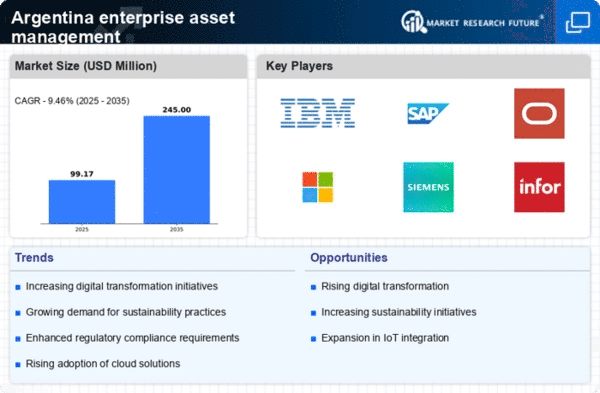Increased Focus on Risk Management
In Argentina, the enterprise asset-management market is witnessing an increased focus on risk management as organizations strive to mitigate potential disruptions. Factors such as economic volatility and regulatory changes necessitate robust risk assessment frameworks within asset-management strategies. Companies are investing in solutions that provide comprehensive risk analysis and management capabilities, which can lead to improved asset resilience. This trend is particularly significant in sectors like finance and manufacturing, where risk exposure can have severe implications. As organizations prioritize risk management, the enterprise asset-management market is likely to evolve, with a growing demand for solutions that address these challenges effectively.
Emphasis on Data-Driven Decision Making
The enterprise asset-management market in Argentina is increasingly influenced by the emphasis on data-driven decision making. Organizations are recognizing the value of data analytics in optimizing asset performance and lifecycle management. By leveraging data insights, companies can make informed decisions that enhance asset reliability and reduce maintenance costs. This trend is particularly relevant in sectors such as energy and utilities, where data analytics can lead to a 15% reduction in operational costs. As businesses continue to prioritize data-driven strategies, the demand for sophisticated asset-management solutions that incorporate analytics capabilities is expected to grow, shaping the future of the enterprise asset-management market.
Growing Need for Operational Efficiency
In Argentina, the enterprise asset-management market is driven by a growing need for operational efficiency across various sectors. Organizations are under pressure to maximize asset utilization while minimizing costs. This trend is particularly evident in industries such as manufacturing and logistics, where asset downtime can lead to significant financial losses. According to recent studies, companies that implement effective asset-management strategies can achieve up to 30% improvement in operational efficiency. As businesses seek to streamline their processes and enhance productivity, the demand for comprehensive asset-management solutions is expected to increase. This focus on efficiency is likely to shape the future landscape of the enterprise asset-management market.
Technological Advancements in Asset Management
The enterprise asset-management market in Argentina is experiencing a notable shift due to rapid technological advancements. The integration of Internet of Things (IoT) devices and artificial intelligence (AI) is enhancing asset tracking and management capabilities. These technologies enable real-time monitoring and predictive maintenance, which can reduce operational costs by up to 20%. As organizations increasingly adopt these innovations, the demand for sophisticated asset-management solutions is likely to rise. Furthermore, the Argentine government is promoting digital transformation initiatives, which may further stimulate growth in the enterprise asset-management market. Companies that leverage these technologies can gain a competitive edge, optimizing their asset utilization and improving overall efficiency.
Rising Investment in Infrastructure Development
Argentina's enterprise asset-management market is poised for growth due to rising investments in infrastructure development. The government has initiated several large-scale projects aimed at improving transportation, energy, and telecommunications infrastructure. These developments necessitate robust asset-management systems to ensure effective oversight and maintenance of assets. It is estimated that infrastructure investments could reach $10 billion by 2026, creating a substantial demand for asset-management solutions. As public and private sectors collaborate on these projects, the enterprise asset-management market is likely to benefit from increased adoption of advanced technologies to manage these assets efficiently.
















